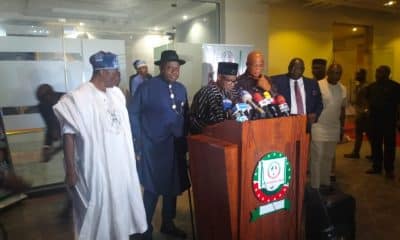Nigeria News
Abacha Family Drags Tinubu To Court Over Revocation Of Late General’s Property In Abuja

Former First Lady of Nigeria, Hajia Mariam Sani Abacha, alongside her son, Mohammed Sani Abacha, have initiated legal proceedings against President Bola Tinubu, Minister of the Federal Capital Territory (FCT), Nyesom Wike, and two other individuals at the Court of Appeal in Abuja.
Naija News reports that the Abacha family are seeking the recovery of a property that they allege was unlawfully revoked by the former Head of State, Late General Sani Abacha.
This property, situated in the Maitama District of Abuja, was allegedly taken back by the Federal Government and subsequently sold to a private entity, Salamed Ventures Limited, without the involvement or consent of the Abacha family.
The Abacha family is appealing to the Court of Appeal to nullify and reverse the decision made by Justice Peter Lifu of the Federal High Court, Abuja, on May 19, 2024, which dismissed their claim to the property.
The case is being brought before the Court of Appeal as the first instance to address the matter and ensure a fair resolution.
The list of respondents in the appeal includes the Minister of the Federal Capital Territory (MFCT), the Federal Capital Development Authority (FCDA), the President of the Federal Republic of Nigeria, and Salamed Ventures Limited.
Mrs Abacha and her son, representing the family, are also seeking the Court of Appeal’s intervention under Section 15 of the Court of Appeal Act to assume jurisdiction over their legal dispute as the primary court of instance and to ensure justice is served.
In their appeal against the ruling of the High Court, the Abacha family contends that Justice Lifu committed errors in both law and justice during the adjudication of their property case.
The appeal filed by Reuben Atabo, a Senior Advocate of Nigeria, on behalf of the Abacha family, is based on eleven grounds and two principal requests for relief.
Among these, the family argues that Justice Lifu made a legal mistake by dismissing their claims at both the High Court of the Federal Capital Territory in the case No: FCT/HC/CV/317/2006 and the Court of Appeal in Appeal No: CA/A/197/2010, which were dismissed due to a lack of jurisdiction.
Furthermore, the appellants assert that the judge made an error in law by relying on Section 39 of the Land Use Act to conclude that the Federal High Court lacks jurisdiction to recover land, in contradiction to the Court of Appeal’s decision that the appropriate court for such cases is the Federal High Court.
Additionally, the family claims that Justice Lifu made a legal mistake by deciding the case without consulting the parties, in violation of the principles of fair hearing as outlined in Section 36 of the 1999 Constitution.
They further argue that both Mohammed Sani Abacha, the first appellant, and Mariam Sani Abacha, the second appellant, have the legal standing to initiate the action, either on their own behalf or with the issuance of letters of administration to the late Army General’s property.
Moreover, the Abacha family contends that Justice Lifu made an error in law by concluding that their case was statute-barred, despite the exceptions to the applicability of the Public Officers Protection Act.
According to their account, the initial summons that precipitated this appeal was lodged at the Federal High Court on May 25, 2015, following the Court of Appeal’s decision on May 18, 2015, which noted the judge’s omission in his judgment regarding the lapse of their cause of action.
Furthermore, they criticized the judge for a legal misstep in acknowledging Salamed Ventures Limited as the fourth respondent, who acquired title to the disputed property during the ongoing litigation between the FCT Minister and the Federal Capital Development Administration.
They contend that a party involved in a legal proceeding is prohibited from transferring title to a third party during the course of the action. They allege that the first three respondents allegedly sold the disputed property to the fourth respondent during the litigation that began on March 1, 2006.
Notice Of Appeal
The notice of appeal reads, “The Certificate of Occupancy upon which the 4th Respondent claims title was issued to it by the 1st – 3rd Respondents on the 25th day of May 2011 during the pendency of Appellants’ appeal to the Court of Appeal with appeal No: CA/A/197/2010.
“By Section 6 of the 1999 Constitution, judicial powers are vested in our Courts, and it is the duty of Courts to determine disputes between individuals and government or government agencies. Where a party to a proceeding transfers title to the property in a dispute, such attitude is an affront on the authority of our Courts, and the same will not be condoned
“The trial Judge of the lower court erred in Law when he held that the revocation of the Appellants title to plot 3119 Maitama, Abuja, was valid even when the purported revocation was not carried out in accordance with Section 28 of the Land
“The learned trial Judge erred in Law when he held that the Appellants action is not for the recovery of land and payment of compensation contrary to the endorsement on the Appellants claim before the Court.
“The Appellant’s action questioned the validity of the 1st – 3rd Respondent’s action to revoke the title to plot 3119 Maitama, Abuja, under a non-existent law and without payment of compensation.
“The learned trial Judge of the lower court erred in Law when he awarded a cost of N500,000.00 in favour of the 4th Respondent, who is neither a proper party nor necessary party before the Court.
“Section 28 of the Land Use Act LFN 2004 stipulates conditions under which a property of a citizen of Nigeria can be revoked, among which is for the outriding public interest.
“The 4th respondent is a Private Limited Liability Company incorporated under the Companies and Allied Matters Act 2020 and was incorporated for the purpose of making a profit; and therefore, not for overriding public interest.
“The revocation of the Appellant title to plot 3119 Maitama, Abuja and the subsequent sale to the 4th respondent during the pendency of proceedings in Court is in violation of the extant law.
“The Appellants have no claim against the 4th respondent from the Originating Summons.
The 4th Respondent decided to join the action of the Appellants even when the Appellants have no claim against her.
“The Appellants pray the Court of Appeal to allow the appeal, set aside the judgment of the Lower court delivered on the 19th day of July, 2024 by Justice Peter Lifu.”
No Locus Standi
On May 19, Justice Lifu rendered a decision dismissing the lawsuit filed by the Abacha family against the Federal Government, contesting the legality of the revocation of the property held by the former military leader.
In his ruling, Justice Lifu based his decision on several grounds, including the argument that the lawsuit had become statute-barred by the time it was initiated in 2015 and that the plaintiffs lacked the legal standing to bring the case forward.
The court determined that the legal action was initiated on February 3, 2006, when the Certificate of Occupancy (C of O) for the property was revoked, several years after the revocation occurred, and more than three months had elapsed since the filing of the case.
Furthermore, the plaintiffs were found to lack the requisite legal standing to file the case due to their failure to submit required documents, such as letters of administration to the Abacha Estate, which are mandated by law and serve as evidence of their claim as Administrators.
The Abacha family sought the Judge’s intervention to invalidate and reverse the revocation of the Certificate of Occupancy (C of O) for the property of the deceased General Abacha.
Their contention was that the Certificate of Occupancy, which designated FCT/ABUKN 2478 for Plot 3119, issued on June 25, 1993, was unlawfully and illegally revoked by the defendants in violation of sections 44 and 28 of the 1999 Constitution and the Land Use Act.
A date for the appeal hearing has not been established.












